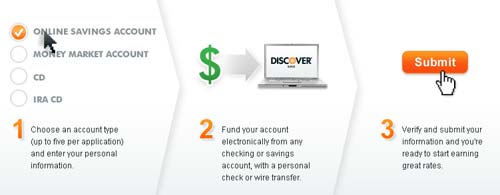Over the past year or so I've done quite a bit of research on online savings accounts. During that time we ended up opening an account with Ally Bank that we've been quite happy with. While their rate is no longer the highest, using them has been easy and pain free.
Only now after I had opened my Ally Bank account did I discover that another bank actually had a higher rate than I had realized, and we could have gotten better returns there. On top of that, from what I'm reading online people are relatively happy with them as well. That bank is Discover Bank.
Quick Navigation
Discover Bank History
Discover Bank was originally known as Greenwood Trust Company, and it first opened it’s doors in Greenwood, Delaware in 1911. They were renamed as Discover Bank in 2000.
Up until just recently they only offered a money market account type, but since then they’ve expanded their offerings to include a full online savings account, along with several other account type options. Since doing so – and since their rate is near the top of current offerings, they’ve quickly become one of the industry leaders in the high yield savings account sphere.
Is Putting My Money With Discover Bank Safe?
With Discover Bank your money will be safe and sound because the bank is FDIC insured, and has been since 1934. If you deposit your money and the bank goes under, you’ll be fine – as long as you don’t have more deposited than the FDIC insurance will cover. Currently that amount is $250,000 per depositor.
Features Of A Discover Bank High Yield Savings Account
Discover Bank’s High Yield Savings Account has a good number of features. Here are a few of them:
- Low opening deposit ($0) plus no minimum balance
- Set up automatic transfers from any checking or savings account
- Rated 5-star Safe & Sound by Bankrate.com
- Bankrate.com Top Tier Winner for consistently high yields
- Fast and free online money transfers
- 24/7 live customer service
- FDIC-insured to $250,000 per depositor
Opening An Account With Discover Bank
Opening an account with Discover bank sounds like a pretty simple process. Their website claims that you can open in “minutes”. Here’s how it works:

- Step 1: You select the account type that you’re choosing, along with whether it is a single or joint account. Enter your personal information including social security number.
- Step 2: Enter your linked bank account information and enter how much you’d like your opening deposit to be.
- Step 3: Verify trial deposits and your account is ready to go.
Doesn’t sound too hard!
Open a Discover Bank account. Click here to get more details now!
Other Discover Bank Account Options
In addition to it’s competitive high yield savings accounts Discover Bank also has other options available including classic CDs, money market accounts, IRA CDs and their traditional credit card offerings. All of their offerings seem to have rates that are currently very competitive or near the top of the bunch. For more details about their other account options, click here.
Conclusion
At the time that I wrote this, Discover Bank has some of the highest interest rates in the country (higher than my Ally Bank account unfortunately) and all of their accounts are FDIC insured. Add to that their other solid account options, no fees or minimums, good security and 24/7 customer service and you have a solid bank offering.
If you’re looking for a good high yield savings account where you can put your money, I think Discover Bank should definitely be on your short list.
Do you have any experience with Discover Bank? Are you using them, and how do you like them? What are the pros and cons of their accounts? Leave us a note in the comments!
Annual Percentage Yield (APY) is accurate as of 3/14/2017. Applies to personal accounts only. Fees could reduce the earnings on the account. Rates may change at any time without prior notice, before or after the account is opened. No minimum balance to open.

So far (2 years in) I’m absolutely loving my Discover savings. The one time I had to use their customer service line I had a great experience. My only worry is how much it may cost when I eventually need to access my money, but I’m reasonably sure I’ve already made up the difference in interest.